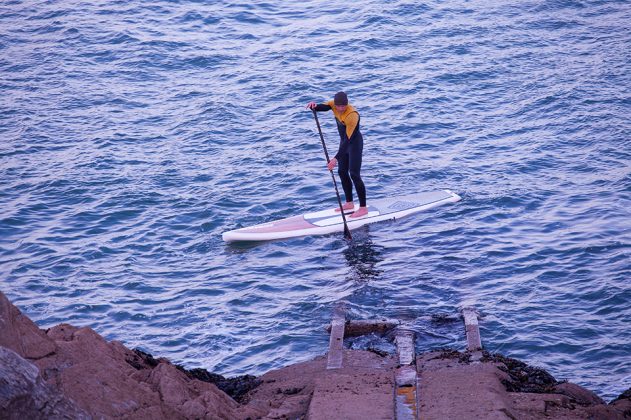PADDLE SCIENCE #11 –
THALASSOTHERAPY
Words – Kate Starling
With a sup board, nearly every bit of open water is available to you for exploration, be it a river, lagoon or the sea. Having grown up and spent my life on the coast, for me there’s nothing better than SUPing on the ocean. Rolling swells and surf on Cornwall’s north coast can give way to reflective glassy conditions on the south coast.
There’s a rawness and endlessly changing side to the ocean, a huge expanse of glittering blueness on sunny days and dark shark grey glowering depths in the winter months. Aside from the expansive visual beauty, if you’re lucky enough to SUP regularly on the sea, have you ever thought about the health benefits saltwater and ocean air can give you? It’s well known that back in Victorian times, people were often encouraged to take a trip to the sea to overcome various ailments such as flu and rheumatism. Even before this, Hippocrates coined a term for the sense of wellbeing the sea can bring. Combining the Greek words ‘thalasso’ – meaning sea – and ‘therapia’ – meaning treatment – he coined it: thalassotherapy. Today, in our search for scientific evidence to support these claims, modern research seems to indicate that spending time in and on the ocean may well do us some good, both physically and mentally.
Breathing Ocean Air Can Improve Respiratory Conditions
If you compare the air in an urban environment, affected by pollutants from buses, cars, and smoking, to the air as you paddle along the shores of the ocean, it’s obvious that the sea air will be far cleaner and better for you. A recent study in Australia set out to determine if breathing in ocean air is beneficial for people suffering from respiratory conditions. The researchers tracked the effects of ocean air on people suffering from cystic fibrosis. Everyone studied spent a lot of time in the ocean due to the fact they all surfed regularly. The study monitored every surfer over a period of 48 weeks and monitored the respiratory status of each person. The study found that salt air beneficially helps to clear the lungs and is therefore of benefit if you suffer from respiratory problems. This doesn’t just have to be cystic fibrosis it could also be relevant to those struggling with asthma or chronic obstructive pulmonary disease. Those who took part in the study also showed fewer flare-ups and had a reduced need for antibiotics. Other studies into people suffering from lung conditions have also found positive effects from ocean air. This includes thinner mucus, improved lung function, a reduction in coughing and reduced sinus pressure. Whether you suffer from a respiratory condition or not, the next time you’re at the beach, make sure that you take in a few deep breaths of fresh ocean air. Typically, we only normally breathe quite shallowly in the uppermost part of our lungs. Aim to breathe in through your nose and out through your mouth, concentrating on expanding your rib cage so that you’re using your diaphragm to breathe. This will help to increase the depth of your breathing and will help to refresh any old air in the bottom of your lungs, replacing it with good clean salt air.
The Sun And Sea Can Boost Your Skin
Vitamin D deficiency is widespread and even if you drink a pint of milk a day and try to keep your calcium levels high, any calcium won’t be absorbed by your body unless you get sufficient levels of Vitamin D from either your diet or from the sun. At this time of year, the sun should now finally be making more of an appearance so aim to take advantage of it, especially if you’ve been inside under artificial lights all day. You only need about fifteen minutes of exposure to the sun in order to reap its benefits. Therefore, as the evenings continue to lighten, aim to get out paddling as frequently as you can, remembering to slather some sun cream on if you’re heading out on the water for a long time. Both the sun and the sea can also help to treat a variety of skin conditions such as psoriasis, which can lead to red, flaking or inflamed patches of skin. Salt water can help to reduce skin inflammation as it contains salt and potassium chloride which both destroy bacteria. Meanwhile, the magnesium levels in sea water can also increase skin elasticity helping to overcome dry skin. In this country, it’s arguable that a lot of the time we find ourselves clad in neoprene from head to toe but as the days grow longer and hopefully warmer, aim to shed the neoprene if you can. Even wearing a shorty wetsuit when you’re SUPing can allow you to have more contact with the sea, or better still, tie in a short swim with your session. Even carrying your board as you walk down to the beach can be beneficial if you choose to go barefoot. The exfoliatory effect of walking on sand can help to remove dead skin cells, helping to soften skin and improve its appearance.
“Hippocrates coined a term for the sense of wellbeing the sea can bring. Combining the Greek words ‘thalasso’ (sea) and ‘therapia’ (treatment he coined it thalassotherapy”
The Ocean Allows You To Unplug
How many hours a day do you spend sending emails, reading the news online or messaging people on your phone? Probably most of it is done sitting and the most active part of you in all of it is probably your hands, thumbs and of course your poor brain which is subjected to an enormous level of blue light in the process. From the moment you strap your board to the roof of the car, drive to the beach and get changed you’ll find that you should already be starting to switch off. Sliding your board into the water forces you to leave your phone in the car for good and to un-plug from the never ending Wi-Fi and 4G which seems to pervade our lives. Being out in nature enables you to really connect with the world around you, free of technology. When you’re paddling on the sea, focus on the movement of the water, the swell, the currents and the motion of the water against the rocks. Look at your surroundings and take in new headlands as you pass them, different rock formations, grassy hillocks, springtime flowers and circling gulls. Don’t just be a passenger on your SUP board, as if you’re on a mobile ferry. Out on the water SUP gives you the privilege of seeing your surroundings from an entirely different perspective. Absorb the ocean environment you’re in and focus on the dynamic and vibrant natural world around you. This can help you to switch off, unwind and reboot, something the majority of us could do with more of.
The Sea Can Reduce Stress
We’ve all seen those t-shirts which say ‘better a bad day on the water than a good day in the office’. Even if you begin a SUP session in a bad mood, unless something goes very, very badly for you out on the water, it’s rare to end a session without feeling lighter in mood, happier and more positive. This is due to the release of our happiness hormones such as endorphins, oxytocin and serotonin which are released by our brains during exercise. Spending time in or on the water can reduce stress levels, reduce depression and anxiety and can really help to boost your overall well-being. The levels of magnesium found in seawater may also help to calm the nervous system down whilst experiencing the feeling of buoyancy and relative weightlessness on the water can help to slow down anxious thoughts, switch off feelings of worry and promote a sense of calmness and relaxation.
The Sea Can Lead To A Great Night’s Sleep
Along with all of the beach’s relaxation-inducing powers, the sound of the ocean can be a natural therapy in its own right. There’s a natural silence as you paddle far out in the sea with nothing but the gentle slap of the water against your paddle and your board to listen to. The repetitiveness of it can feel both calming and relaxing. However, even more than this, a day in the great outdoors breathing in fresh air and exposing yourself to natural sunlight can be a great way to regulate your sleep. Think of the last time you went for a long SUP on the ocean and then hung out on the beach for the rest of the day? Being outside all day in the fresh ocean air can leave us feeling invigorated and refreshed yet satisfyingly tired and craving sleep. SUP
Kate is a physiotherapist and standup paddler. Reach her at www.newquayphysio.co.uk


